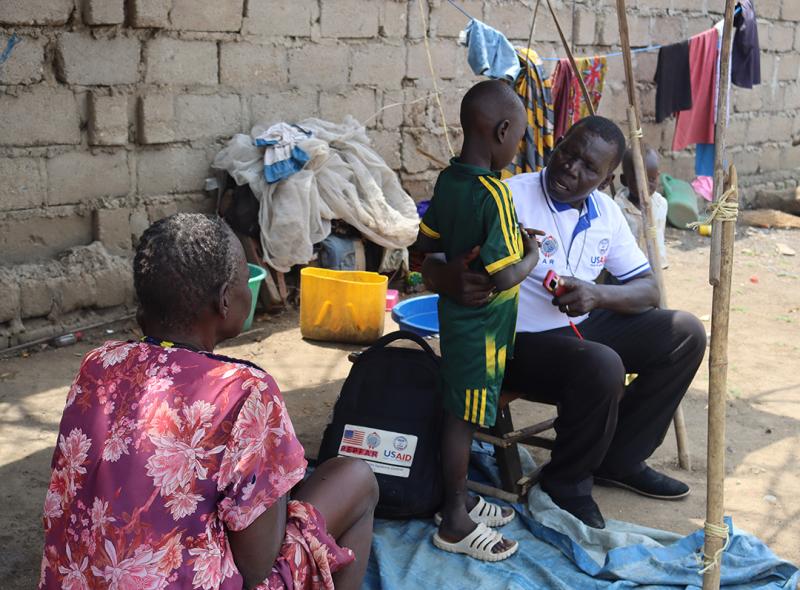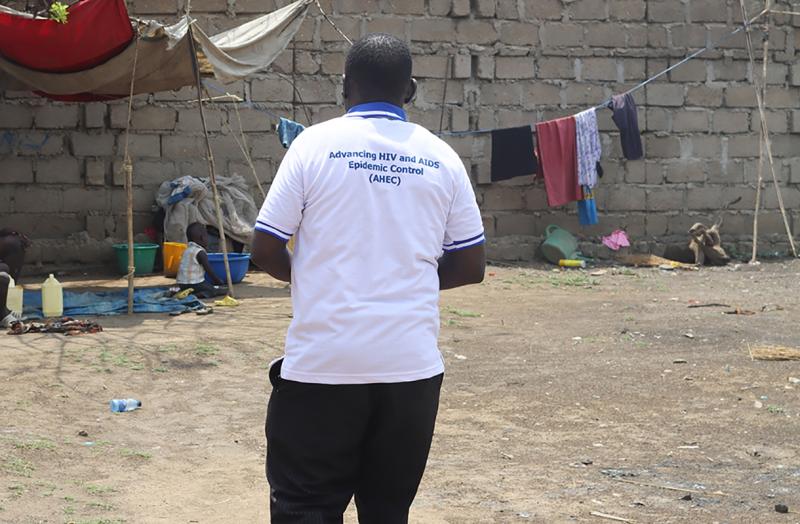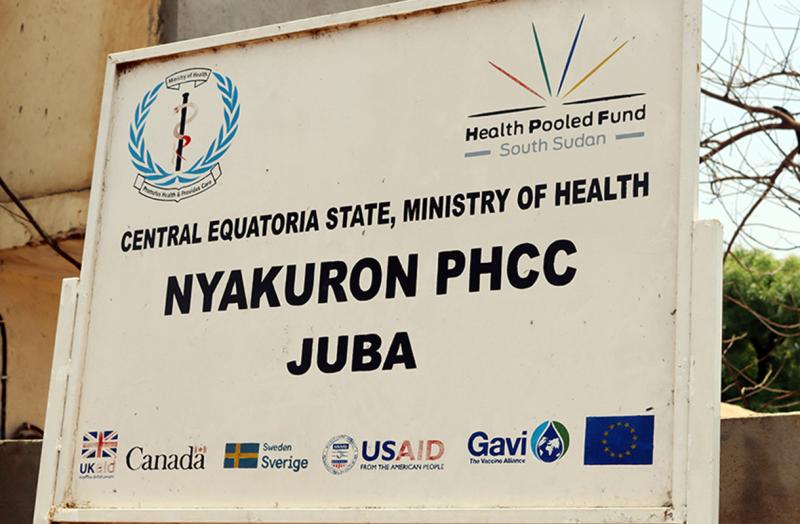Where We Work
See our interactive map


Lawrence Monday, a community outreach volunteer (COV), speaks with his young client, Timo, while Timo's grandmother looks on. Photo by Achan Gladys for IntraHealth International.
During World Health Worker Week we’re paying tribute to the wide range of #SafeSupportedHealth Workers who are making a difference in tough situations.
In South Sudan, community outreach volunteers (COVs) like Lawrence Monday play a key role in the HIV response—linking health facilities and communities to extend services and acting as peers to people living with HIV. Under the supervision of an adherence nurse, Lawrence supports 160 clients on HIV treatment, including 15 children.
One of the children Lawrence helps is Timo*, who had a rough start in life. He was born in 2017 into a low-income family in Juba. His biological father was never around to help him as a baby, and his 25-year-old single mother had no job to support him or his two older siblings. She often went to the market to dance with Timo wrapped on her back, and well-wishers would give her some money or food items, which would help feed them for a few days.
Timo’s mother knew she was HIV-positive. Although she had been receiving antiretroviral therapy (ART) from Nyakuron Primary Health Care Center (PHCC), when she became pregnant with Timo in 2016, she refused to take treatment and didn’t attend antenatal appointments. She feared she would be stigmatized at the health facility because she knew people who worked there.
When it was time for Timo to be born, his mother had a home delivery without a skilled health care provider. When Timo was three months old, both he and his mother became very ill. He couldn’t breastfeed well, became restless, and started bleeding from the navel. His 60-year-old grandmother rushed him to Nyakuron PHCC where he was assessed and diagnosed with HIV, and immediately enrolled on ART.
With the help of his grandmother, Timo successfully attended treatment for the following year. However, his ailing mother was often intoxicated. She would leave the children with her mother and dash down to a local spree to drink.
Timo’s mother continued to refuse treatment, and in 2022 succumbed to complications of HIV. At the time, Timo and his siblings were already fully under his grandmother’s care and they largely depended on the support of well-wishers.
Nyakuron PHCC is now one of 14 health facilities supported by the Advancing HIV/AIDS Epidemic Control Activity (AHEC). AHEC is a four-year USAID-funded contract led by IntraHealth International building local capacity to provide comprehensive HIV services and free ART to people living with HIV in South Sudan. By partnering with the health facilities and local organizations, the South Sudanese government, and communities, AHEC helps train health workers to deliver high-quality HIV services and adapts evidence-based HIV prevention, care, and treatment interventions for people living with HIV.
In 2021, early on in the project, AHEC trained 160 COVs, including Lawrence Monday. The project provides a stipend and mobile phone airtime for communication to the COVs. In 2013, AHEC attached Lawrence to Timo to monitor his treatment progress through home visits and offer emotional and psychological support.
“It’s a challenge to keep children on treatment but the regular home visits are paying off,” Lawrence says. “I visit all my clients twice every six months, and I visit children at least once a week, because they easily forget to take their medication, to ensure that they adhere to medication. Within the last month, I’ve registered only 5 out of 160 clients with high viral loads, whom I’m closely following up for adherence counseling.”
“It’s a challenge to keep children on treatment but the regular home visits are paying off,” Lawrence says.
Timo was one of those who needed extra follow-up. In February 2023, when Timo was five, he lost weight and became very weak. When health providers at Nyakuron PHCC assessed him, his viral load was too high and unsuppressed. He seemed traumatized by the absence of his mother, lacked enough food, and sometimes refused the bitter taste of the medicine. The health providers developed a monitoring action plan, and after four months of Enhanced Adherence Counseling, his viral load was suppressed. The health provider transitioned Timo from Lopinavir to Dolutegravir and guided his grandmother on how to prepare and give him the medication. Lawrence helped link Timo to a nutrition center within the health facility where he received food portions monthly until his health improved by June 2023.
However, in October 2023, Timo developed swollen lymph nodes and a cough and was losing weight. During a home visit, Lawrence noticed Timo’s symptoms and immediately rushed him to Nyakuron PHCC, where he was referred to Al-Sabah Childrens’ hospital. Health workers at the hospital diagnosed Timo with opportunistic infections, including tuberculosis (TB). Timo was put on anti-TB treatment for six months, which he successfully completed with the help of Lawrence.

Lawrence Monday walks to visit Timo. The Advancing HIV/AIDS Epidemic Control Activity (AHEC) trained 160 COVs like Lawrence to monitor HIV clients' treatment progress. Photo by Achan Gladys for IntraHealth International.

Timo's grandmother brought him to Nyakuron PHCC. It is now one of the facilities supported by the USAID-funded Advancing HIV/AIDS Epidemic Control Activity (AHEC). Photo by Achan Gladys for IntraHealth International.
Lawrence visited Timo’s home every two days while he was on anti-TB treatment. He walked two kilometers each way to Timo’s house to ensure he took his medications consistently. “I had to pay more frequent visits to monitor Timo’s treatment progress, especially because he was on both HIV and TB medications. I used to count the tablets to keep track of his medication consistency,” says Lawrence.
Timo is now TB-free and virally suppressed of HIV, following his last viral load test in October 2023. He now looks jolly, is playful, eats well, and weighs an impressive 23kgs. He is one of the 386 children receiving ART from AHEC-supported facilities in South Sudan, as of September 2023. Overall, AHEC currently supports 12,694 active clients on treatment. IntraHealth also linked Timo to Jhpiego, which enrolled him in their USAID Orphans and Vulnerable Children (OVC) program and plans to consider him for academic support in 2024.
“Timo is very healthy now and helps me around with minor chores, which makes me happy. I don’t want him to contract another disease. I’m doing everything it takes to ensure that he eats well and sticks to his medication,” Timo’s grandmother proudly concludes.
*Not his real name.
Get the latest updates from the blog and eNews




